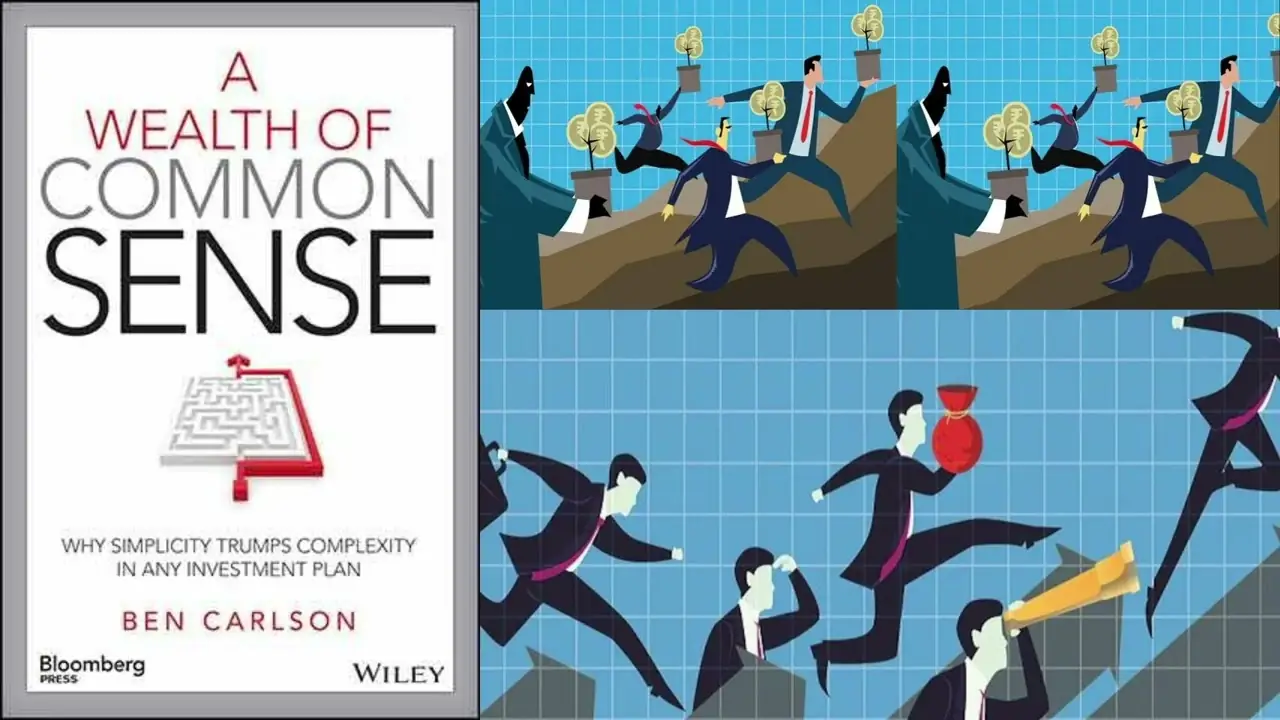When it comes to investing, it’s easy to feel overwhelmed. There’s a constant stream of jargon, market updates, and endless advice from “experts.” But what if I told you that simplicity—not complexity—is the secret sauce to financial success? That’s the core message of A Wealth of Common Sense: Why Simplicity Trumps Complexity in Any Investment Plan by Ben Carlson.
If you’ve ever struggled to make sense of your investment strategy, this book is like a friendly guide taking your hand and saying, “Hey, let’s make this easier.” Let’s dive into what makes this book so powerful and why it belongs on your reading list.
The book on amazon 👉 A Wealth of Common Sens 📚
Why Read This Book?
Let’s be real—most of us aren’t hedge fund managers or stock market wizards. And the good news? We don’t have to be. Ben Carlson makes a compelling case that successful investing isn’t about picking the right stock or timing the market perfectly. Instead, it’s about having a solid plan, staying disciplined, and embracing simplicity.
Here’s why this book is a game-changer:
- It’s relatable: Carlson writes in a way that’s easy to understand, even if you’re new to investing.
- It debunks myths: He challenges the idea that you need to follow complex strategies to grow wealth.
- It’s actionable: You’ll walk away with practical steps to simplify your investment approach.
Key Takeaways
Here’s what really stuck with me after reading the book:
- You don’t need to be a genius to invest wisely. A simple, diversified portfolio can outperform flashy, complicated strategies.
- Discipline matters more than timing. Markets go up and down, but sticking to your plan is what keeps your portfolio growing.
- Focus on what you can control. You can’t control the market, but you can control your savings rate, fees, and investment choices.
Simplifying Your Path to Wealth
After diving into A Wealth of Common Sense, I walked away with some profound lessons that shifted my perspective on investing. Let’s break them down in detail:
1. You Don’t Need to Be a Genius to Invest Wisely
Investing can feel intimidating, but Carlson reassures us that you don’t need a finance degree—or insider knowledge—to succeed. In fact, most “genius-level” investors often overthink their strategies, leading to poor results. Carlson explains that a simple, well-constructed plan often beats overly complicated tactics.
For example, instead of trying to pick the next big stock or jumping on the latest trend, focus on low-cost index funds. These funds mimic the performance of the overall market or a specific sector, spreading your risk across many investments. Historical data shows that these simple tools outperform most actively managed funds in the long run.
By eliminating the pressure to “outsmart” the market, you can focus on what really matters: consistency and long-term growth.
2. Discipline Matters More Than Timing
Timing the market is the Holy Grail of investing—or so many believe. But here’s the truth: even the best investors can’t consistently predict market movements. Carlson shares stories of people who tried (and failed) to time their investments perfectly, often missing out on big market rebounds after a crash.
Instead, Carlson emphasizes the importance of discipline. This means sticking to your investment plan during market highs and lows. It’s about trusting the process, even when it’s tempting to sell during a downturn or chase a hot stock during a boom.
Here’s an eye-opening stat from the book: if you missed just the 10 best trading days in a 20-year period, your investment returns could be cut in half. That’s why staying the course, even when the market feels volatile, is crucial.
Discipline also extends to regular contributions. Automating your investments—like setting up a monthly transfer to your retirement account—helps you stay consistent without the emotional rollercoaster.
3. Focus on What You Can Control
One of my favorite lessons from Carlson is this: don’t waste time worrying about things you can’t influence. Markets will always be unpredictable, interest rates will fluctuate, and world events will cause turbulence. Instead, focus on factors within your control:
- Savings Rate: The amount you save is one of the biggest predictors of financial success. While market returns vary, consistently saving a portion of your income builds a foundation for wealth.
- Investment Fees: High fees eat into your returns over time. Carlson highlights the importance of choosing low-cost investments, like index funds or ETFs, to keep more of your money working for you.
- Diversification: Spreading your investments across different asset classes—like stocks, bonds, and real estate—reduces risk and protects your portfolio during downturns.
- Your Time Horizon: Investing is a long-term game. By focusing on years or decades, rather than days or months, you avoid the stress of short-term market swings.
Carlson’s mantra is simple yet powerful: “Control what you can, and ignore the rest.” This mindset not only leads to better investment outcomes but also reduces anxiety about factors beyond your grasp.
4. Patience is the Ultimate Superpower
Here’s the thing: wealth doesn’t happen overnight. Carlson drives this point home with the example of Warren Buffett. While Buffett is a legendary investor, much of his wealth came from decades of compounding, not quick wins.
Consider this: Buffett earned the bulk of his fortune after his 50s, simply because he started young and let time do the heavy lifting. It’s a perfect illustration of the magic of compound interest—the process of earning returns on both your original investment and its growth.
Carlson encourages readers to embrace patience and think of investing like planting a tree. You water it regularly, give it time, and eventually, it grows into something magnificent. Trying to rush the process often leads to mistakes, like selling too soon or chasing trends.
5. Simplicity Reduces Stress and Boosts Success
Let’s face it: investing can feel overwhelming, especially when faced with a flood of information and choices. Carlson’s ultimate takeaway is that simplicity isn’t just easier—it’s smarter. By sticking to a straightforward plan, you reduce decision fatigue and free yourself from the constant “What should I do next?” mindset.
Here’s a simple, effective approach he recommends:
- Build a diversified portfolio of low-cost index funds.
- Contribute regularly, no matter what the market is doing.
- Rebalance occasionally to maintain your desired asset allocation.
- Ignore the noise—like market predictions or daily headlines.
This approach not only delivers solid returns but also keeps you focused on your long-term goals, rather than getting caught up in short-term distractions.
This is are more than just investing tips—they’re a mindset shift. Carlson’s book reminds us that anyone can grow wealth with the right habits and perspective. And the best part? It’s not about working harder or knowing more. It’s about keeping things simple, staying patient, and playing the long game.
So, which of these lessons resonates with you the most? Let me know in the comments below—I’d love to hear your thoughts!
Join the Conversation!
What’s your approach to investing? Are you team “Keep It Simple” or team “Analyze Everything”? I’d love to hear your thoughts—and any tips you’ve picked up along the way.
Let’s share our experiences in the comments below. Because if there’s one thing I’ve learned from A Wealth of Common Sense, it’s that investing doesn’t have to be lonely—or complicated.
So, grab a coffee (or your beverage of choice), and let’s chat. After all, building wealth is better when we do it together!
The book on amazon 👉 A Wealth of Common Sens 📚
quotes from A Wealth of Common Sense:
“The biggest advantage individual investors have over the pros is the ability to think and act for the long-term.”
Many investors panic when the market fluctuates, but those who stay patient and focus on long-term growth are often the most successful.
“Simplicity is the key to successful investing. Complexity leads to more decisions, and more decisions lead to more mistakes.”
Trying to outsmart the market with complicated strategies often backfires. A simple, disciplined approach is usually more effective.
“Time in the market is far more important than timing the market.”
Instead of worrying about the perfect moment to invest, it’s better to get in early and let compound interest work its magic.
“Successful investing is about managing risk, not avoiding it.”
No investment is risk-free, but having a solid strategy—like diversification and consistency—helps you navigate uncertainty.
“The best investment strategy is the one that allows you to sleep at night.”
If your investments keep you up with worry, it might be time to simplify your approach and adjust your risk level.
Which of these quotes resonates with you the most?



